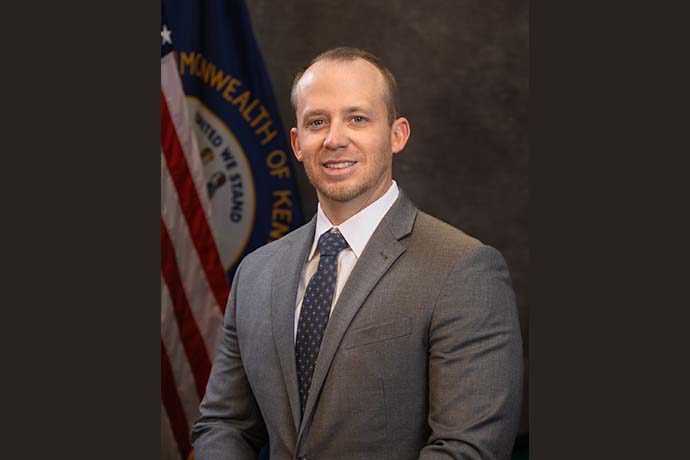NASHVILLE – Leading meat and poultry companies such as Tyson Foods, JBS and Perdue know about the protein processing prowess to be found in Kentucky. But Jonathan Shell, the state’s Agriculture Commissioner took to the road to spread the word at the 2024 Annual Meat Conference held in Nashville March 18-20. He arrived at the AMC in Nashville to visit the expo, make connections and build relationships.
“That’s why I’m here today to be able to help further build relationships with not only our large processors, but also the partnerships that they have from the packaging side of the industry to the chemical side of the industry, to really help them to understand that Kentucky is wide open for business,” Shell said.
Shell, who was sworn into office in January, said Kentucky has “a deep heritage in processing facilities,” which makes the state a good processing hub on the East Coast.
“We’ve got a JBS plant there that’s been there for generations now in Louisville and does an amazing job,” Shell said. “Still today, kills about 10,500 hogs a week there in the city of Louisville, and we’ve got several other processors in the state that are Tyson owned or Perdue owned, or other facilities that are there.”
“On the chicken side of it, we’ve got about 90 processors that are on the small to midsize level in the state of Kentucky. And the reason that I’m here today is because I recognize these as the largest assets that we have in Kentucky. They’re the end users for our state in many circumstances.”
Shell noted the prevalence of major processors in the state, like Tyson Foods, which operates a facility in Henderson, Ky., that supplies frozen chicken to Walmart. The JBS pork plant in Louisville supplies Costco.
Additionally, Tyson opened a further processing plant for bacon in Bowling Green, Ky., that Shell said is home to a large refugee center.
“The thing that I love about this industry is that there’s room for everybody,” he said. “There’s room for the small processor, there’s room for the large processor, because from the consumption side of it, we want to have variety and availability for our consumers to be able to choose from in a very good and sustainable way — what the consumer wants — and to be able to tell the story that we have and in agriculture, that’s what we’re trying to do in Kentucky.”
Shell said his administration has been in office for more than 70 days and has started reaching out to the state’s largest companies, asking how his office can help them do business in Kentucky.
“Is it a local government issue?” Shell asked. “Do we have water issues? Do we have electric issues? Are there things that we can do in a direct fashion? Is there a way that we can help craft better tax policy in the state of Kentucky towards processing facilities, further processing and ag specific businesses? Are there ways that we can help connect on the housing industry in the state of Kentucky for low to middle income housing?”
In Kentucky, the Agriculture Commissioner sits on the Housing Corporation Authority Board, and many of the companies that are a part of the Meat Institute have housing issues with their employees. And it’s a challenge nationwide for processors.
“We have an inventory issue right now especially, middle to low income housing,” Shell said. “And that’s what we’re trying to help fix and working on partnerships of what that could look like, of helping connect them with developers locally, with attorneys that understand this, and also with the monies that are there at the Corporation Authority Board.”
Shell said he is “deeply passionate” about bringing more agribusiness to Kentucky for the economic development benefits to local communities. He said the industry helps individuals build their own American dream.
“I’ve got a huge passion for trying to connect these things together,” he said. “It gives us availability on the farm to be able to sell our products more directly to a consumer or more directly to a company.
“It gives economic development for our people that are not in agriculture to have a job in our local communities. It also gives a presence for community from these corporations because the ones that we have in Kentucky are amazing community partners. They’re, they’re involved in the local t-ball. They’re involved in the local hunger initiatives. They’re involved in the local food banks. They’re the ones that are helping support these communities, whether they’re large, medium, or small. And I want them to know how much we appreciate them in Kentucky.”

